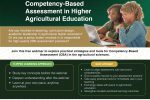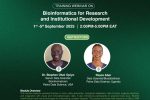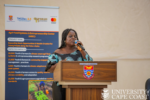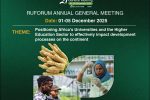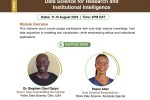Science positioned as a catalyst for Africa’s growth at RUFORUM’s 21st Annual General Meeting Launch
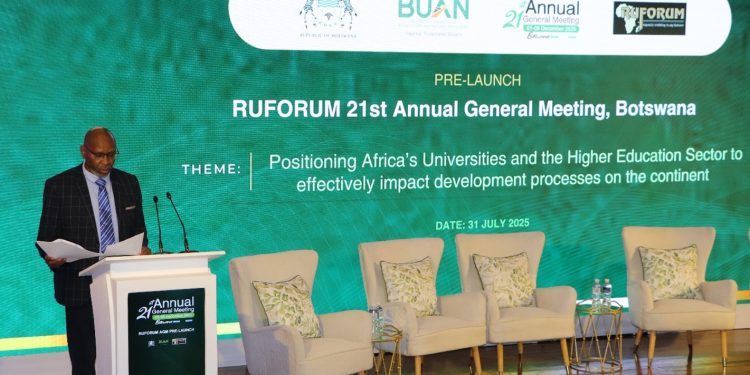
Gaborone, Botswana [31 July 2025] – with the continent at a crossroad in its development trajectory, the Regional Universities Forum for Capacity Building in Agriculture (RUFORUM) is gearing up for its 21st Annual General Meeting (AGM), set to take place from 1 – 5 December 2025 in Gaborone under the theme “Positioning Africa’s Universities and the Higher Education Sector to Effectively Impact Development processes on the continent”.
The central question guiding the AGM is: “What will it take to position Africa’s universities and higher education sector to effectively impact the continent’s development process?”
To set the agenda for December’s gathering, RUFORUM, in partnership with Botswana’s Ministry of Higher Education and the Botswana University of Agriculture and Natural Resources (BUAN), hosted a high-level hybrid launch event. The launch emphasized the urgent need to realign Africa’s universities with national and continental development priorities, particularly in agriculture, science and innovation.
“We can no longer treat agriculture and higher education as auxiliary sectors. They are strategic engines for driving development,” said Prof. Cliff Sibusiso Dlamini Executive Director, CCARDESA (Centre for Coordination of Agricultural Research and Development for Southern Africa)
This sentiment was echoed by several speakers who underscored that Africa’s future, lies not only in the productivity of its soil but also in the innovation and knowledge cultivated in the minds of youth and the critical role that universities must play in converting this knowledge into tangible, scalable solutions.
Prof Patrick Okori, Executive Secretary RUFORUM
In his opening remarks, RUFORUM Executive Secretary Prof Patrick Okori, extended heartfelt thanks to the Government of Botswana and praised its commitment to higher education and science-led development. “This meeting brings Africa to Botswana and takes Botswana to Africa,” he noted, describing the AGM as a platform for building shared strategies for Africa’s sustainable future.
In addition to RUFORUM’s ongoing work to promote climate-resilient agriculture with strategic partners such as the Carnegie Corporation of New York, European Union, Mastercard Foundation, and other global partners, Prof Okori also highlighted several continental frameworks which RUFORUM is a key implementer, namely; The refreshed Comprehensive Africa Agricultural Development Programme (CAADP), known as the Kampala Declaration, which calls for resilient agri-food systems and institutional strengthening; The Second Ten-Year Implementation Plan (STYIP 2024-2033) of the African Union’s Agenda 2063, which targets five-fold increase in Africa’s contribution to global scientific research; The African Union Youth Charter and Africa Youth Employment Strategy, which promotes diverse, inclusive education systems and skills development as tools for unlocking Africa’s demographic dividend.
Prof Ketlhatlogile Mosepele, Vice-Chancellor of BUAN
Botswana’s Vice Chancellor of BUAN, Prof Ketlhatlogile Mosepele stressed the urgency: “We must co-create the higher education, science, technology, and innovation agenda that Africa needs.” He pointed to the continent’s youth bulge and job scarcity as a call to action. “Africa produces 12 million job seekers annually, yet the economy generates only a third of those jobs,” he noted, calling for a paradigm shift in university operations.
Drawing on findings from Elsevier’s (2024) study, Prof Mosepele called for Africa’s transition toward “fourth-generation universities” – institutions embedded in their societies, engaging directly with industry, government, and civil society to foster regional innovation ecosystems.
The continent’s agricultural productivity has not significantly changed since the 1960s despite a five-fold population increase, was highlighted as both a challenge and opportunity. Agriculture accounts for 35% of Africa’s GDP and employs over half of its population. According to the African Development Bank, the sector’s market value could triple to $1 trillion by 2030, if backed by science, technology and sufficient investment.
Hon. Prince Maele, Botswana’s Minister of Higher Education
Hon. Prince Maele, Botswana’s Minister of Higher Education, did not shy away from highlighting the continent’s most glaring challenges: Africa’s low density of scientists. Africa currently has just 198 scientists per million people, far below the global average of 1,150 – significantly behind smaller nations such as Chile.
“This must change.” Minister Maele stressed. “If Africa is to break the cycle of dependency and underdevelopment, our universities must lead in knowledge production, innovation and economic transformation.”
He also underscored the importance of reversing the decline of agriculture in Botswana’s economy, calling for stronger investment and integration of agricultural science, education, and technology in the national development agenda.
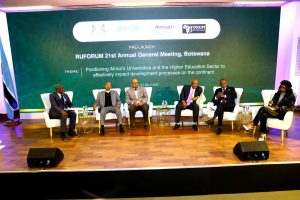 Moderator Prof Justin H. Chepete; Prof. Cecil Patrick, Associate Professor, BUAN; Prof. Otlogetswe Totolo, Vice Chancellor, Botswana International University of Science and Technology; Prof. David Norris, Vice Chancellor, University of Botswana; Prof. Julius Atlhopheng, The National Agricultural Research and Development Institute (NARDI); Ms. Tebogo Cleopatra Bahiti, Youth Engagement and Climate Officer, Green Africa Youth Organization (GAYO)
Moderator Prof Justin H. Chepete; Prof. Cecil Patrick, Associate Professor, BUAN; Prof. Otlogetswe Totolo, Vice Chancellor, Botswana International University of Science and Technology; Prof. David Norris, Vice Chancellor, University of Botswana; Prof. Julius Atlhopheng, The National Agricultural Research and Development Institute (NARDI); Ms. Tebogo Cleopatra Bahiti, Youth Engagement and Climate Officer, Green Africa Youth Organization (GAYO)
An insightful panel discussion followed the keynote speeches, moderated by Prof Justin H. Chepete bringing together senior leaders from academia, research institutions and youth organisations. Over 250 participants joined virtually from over 20 countries across the continent. The key takeaways included:
- Diversification of energy research: African universities and National Agricultural Research Institutions (NARIs) should extend beyond solar panel production to broader renewable energy value chains that support agri-product processing and climate resilience.
- Agriculture as the economic anchor: Speakers argued that African economies should be rooted in agriculture, with the academic sector playing a lead role in driving agricultural investment and policy.
- Bridging research and application: A call was made to strengthen agricultural extension systems, ensuring that scientific research benefits farmers and communities to avoid limiting it to laboratories.
- Investment towards research and innovation: The chronic underfunding of science was flagged as a critical barrier. Calls were made for government and private sector to commit a meaningful portion of their budget to research and higher education.
As RUFORUM, the Government of Botswana and BUAN prepare to convene education stakeholders from across the content in December, the message is clear: Africa’s future lies in the power of its knowledge and innovation systems. Universities must be repositioned as dynamic centers of problem-solving, innovation and inclusive growth, and science must be recognized not as a luxury, but as a catalyst for transformation.
The 21st RUFORUM AGM is poised to be a landmark event, bridging policy and practice, and reaffirming the pivotal role of higher education in shaping a prosperous, resilient and self-reliant Africa.




